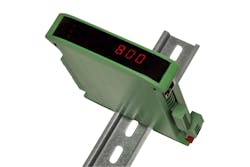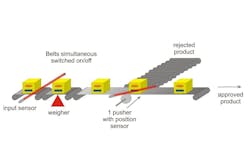The e-mark directive’s impact on check-weighing
Regardless of package size — individual packets, larger boxes, big bags or otherwise — similar weight-control challenges impact how much making things costs and how profitable making them is.
Whether a check-weighing system is static or dynamic, industrial size or simply a small shop-floor unit, over-filling results in product spilled and profits lost, while under-filling can lead to unhappy customers and even legal issues, such as the withdrawal from distribution channels of packages outside industry-standard tolerance levels.
In addition, the ramifications of international trade legislation and standards, such as those in Europe, warrant taking a close look at how best to achieve accurate, fair and proper filling of any package.
In Europe, the e-mark directive applies to packages up to 10 kilograms, filled based on average weight. While it especially applies in Europe, the e-mark principle can minimize raw-material or product losses for any manufacturer filling packages.
An automated administered e-mark protocol also makes additional checks redundant. Filling that follows this protocol leads to business opportunities in the EU market.
Fast check-weighing — at a typical speed of 1,600 samples per second — delivers rapid throughput, less spillage and more continuous filling for a faster return on investment.
Check-weighing background
Check-weighers are automated systems for weighing packaged commodities for internal control and external trade application. The process usually occurs at the end of any given packaging flow.
For external trade, legal requirements are obligatory. The International Organization of Legal Metrology (OIML) recommendation, R51, outlines these rules. The Measuring Instruments Directive (MID) is Europe-specific, while the NIST Handbook 44, 2014 edition, covering check-weighers in chapter 2.24, is relevant to the U.S.
Two types of check weighers are:
Category X — To determine and compare weight within defined tolerances for purposes of package acceptance or discard. Such tolerances are typically mandated, similar to the e-mark registration. Packages outside the given tolerances are automatically removed from the process line.
Category Y — To determine package mass, useful when establishing price calculations based on weight.
Each category further differentiates as either "static" or "dynamic."
In the latter case, the package is in motion, on a conveyor belt for example. This typically has an adverse effect on weight because of acceleration and mechanical-part vibration.
Under such circumstances, PENKO instruments with sophisticated filtering processes can be used because they are certified in accordance with the MID directive and OIML R51 recommendation. For registration purposes, specifically designed e-marking software is available.
The software enables data transfer directly to a printer or a centralized storage base on a personal PC. Where filling on average weight is not permitted, this feature still offers opportunities for data analysis to optimize filling results.
The fill data is sent from a certified system directly to an e-mark registry. This process eliminates expensive and time-consuming check-weighing and allows for problem-free export into the European Economic Area (EEA).
Whatever the type of check-weighing system, over-filling leads to spills, while under-filling may lead to unhappy customers or other issues. (Courtesy PENKO)
Check-weighing solutions
A high-resolution filtering system combined with high-speed/high-accuracy measuring, offers smart-weighing results for any operational environment.
Many check-weighers include simultaneous on/off switching of the three belts, as well as belt-weigher and variable belt-speed options. E-mark registration capability is optional as well as a barcode reader option. The controlled measuring circuit is by an active sensor, rendering load cells intrinsically safe for use in hazardous areas.
Other check-weighers are equipped to stop the supply feed when operation is interrupted, to control the push-out position on over-filling, to suppress dynamic effects by means of the belt profile, and to independently push out light or too-heavy packages. Connection to a metal detector is also possible.
All instruments are certified and approved with an accuracy of 10.000d. The combination of measuring at high speed (1,600 samples per second) with a high internal resolution (24 bit), smart filters and sufficient computing capacity, make them suitable for any check application. Combining high-resolution and conversion-speed guarantees the best achievable mass control accuracy, even at high speeds, therefore preventing elimination of packages and recalls.
In addition, a range of digitizers/controllers offers a compact device for use as a standalone controller in network configurations, fulfilling a specific check function.
A versatile apparatus is an all-in-one compact, reliable and user friendly indicator/controller, suitable for automatic and non-automatic weighing. It is highly suitable for complex weighing applications.
Digital and analog inputs/outputs are optional.
Final words
Having a filling system and checking application as one has benefits.
Checking packages for trade at high speed and accurately, while adhering to regulations in the most effective way, remains a challenge throughout the processing industries and will vary from one manufacturer to another. Consideration needs to be given not only to dynamic effects, but also to the prevention of incorrectly filled packages entering the market, with the resulting rejection of packages and inevitable recalls.
When engineering the most efficient method per industry, per product and per manufacturer, there is no "one-size-fits-all" solution.
Vincent van der Wel is president of PENKO Engineering B.V.
PENKO Engineering B.V. specializes in the development and manufacture of high-accuracy and reliable electronic weighing and dosing systems for process industries. It also provides original equipment manufacturers with a wide range of weighing and dosing measurement, display and sequencer components and products for integration in automated machinery. Established more than 30 years ago, Netherlands-based PENKO was acquired in 2004 by ETC of Middleton, Wisconsin.

